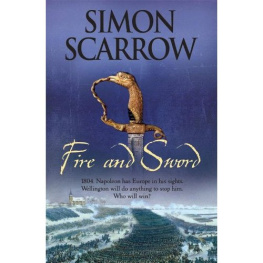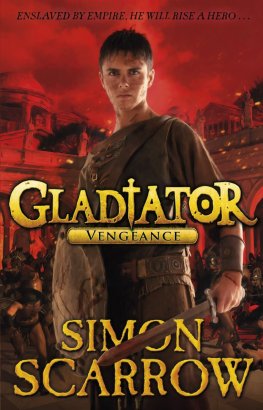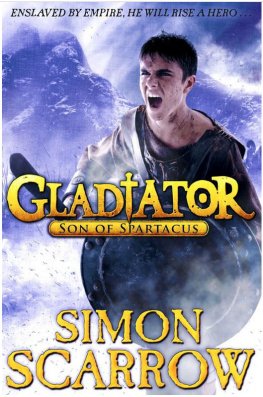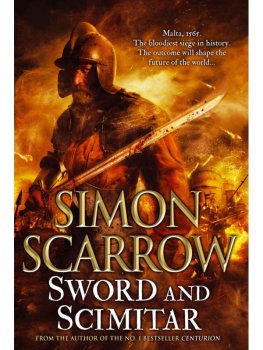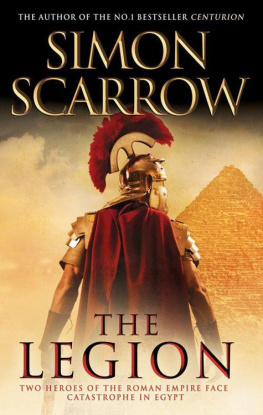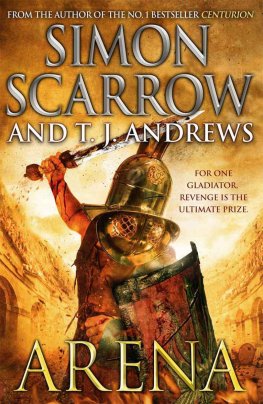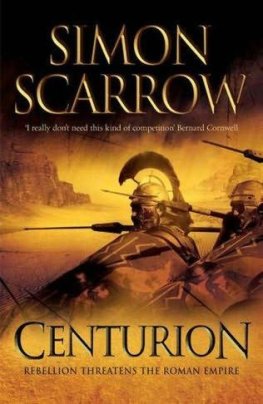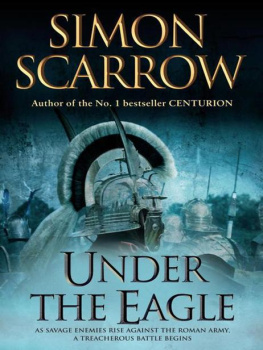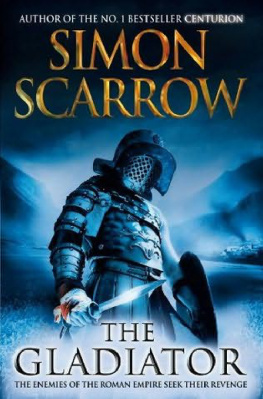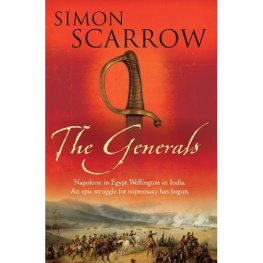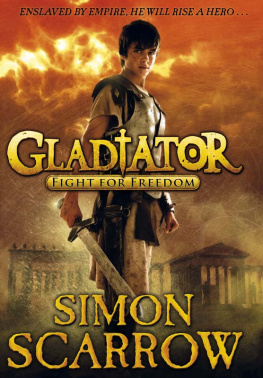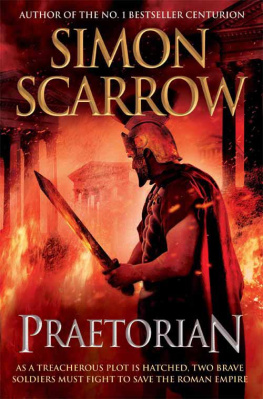Simon Scarrow - Gladiator
Here you can read online Simon Scarrow - Gladiator full text of the book (entire story) in english for free. Download pdf and epub, get meaning, cover and reviews about this ebook. genre: Adventure. Description of the work, (preface) as well as reviews are available. Best literature library LitArk.com created for fans of good reading and offers a wide selection of genres:
Romance novel
Science fiction
Adventure
Detective
Science
History
Home and family
Prose
Art
Politics
Computer
Non-fiction
Religion
Business
Children
Humor
Choose a favorite category and find really read worthwhile books. Enjoy immersion in the world of imagination, feel the emotions of the characters or learn something new for yourself, make an fascinating discovery.

- Book:Gladiator
- Author:
- Genre:
- Rating:5 / 5
- Favourites:Add to favourites
- Your mark:
- 100
- 1
- 2
- 3
- 4
- 5
Gladiator: summary, description and annotation
We offer to read an annotation, description, summary or preface (depends on what the author of the book "Gladiator" wrote himself). If you haven't found the necessary information about the book — write in the comments, we will try to find it.
Gladiator — read online for free the complete book (whole text) full work
Below is the text of the book, divided by pages. System saving the place of the last page read, allows you to conveniently read the book "Gladiator" online for free, without having to search again every time where you left off. Put a bookmark, and you can go to the page where you finished reading at any time.
Font size:
Interval:
Bookmark:
Gladiator
Simon Scarrow
PROLOGUE
Centurion Titus Cornelius Pollenius mopped his brow as he surveyed the battlefield stretching out around him. The hillside was covered with bodies, heaped together in those places where the fighting had been most fierce. His men were searching for injured comrades, or gleaning what little loot they could from their fallen enemies. Here and there the wounded cried out pitifully as they writhed amid the carnage. Among the bodies were Roman legionaries in their red tunics and chain-mail armour, now stained with blood. Titus estimated that thousands of his comrades had been killed in the battle. Even so, the Roman losses were nothing compared to those of the enemy.
He shook his head in wonder at the men, and women, he had faced earlier. Many had been armed only with knives and agricultural tools and most had no armour, not even shields. Yet they had thrown themselves on Titus and his comrades, shrieking with rage and eyes blazing with desperate courage. None of which had saved them from defeat against the better-trained and properly equipped soldiers of General Pompeius, the commander of the Roman armies that had pursued and trapped the enemy.
Slaves, Titus muttered to himself in wonder as he stared at the bodies. Just slaves.
Who would have thought that the men and women whom most Romans regarded as little more than walking tools would have had so much fight in them? It had been almost two years since the slave revolt began and since then they had defeated five of the legions that Rome had sent against them. They had also burned many of the villas and pillaged the estates of the most powerful families in Rome. Once, Titus recalled, the slaves had even marched on Rome itself.
Looking down, he saw the body of a boy, little more than ten years old, he guessed. Flaxen-haired and finely featured, the boys head lolled back over the armour of a dead legionary. The boys eyes stared into the bright sky and his mouth hung slightly open as if he was about to speak. Titus felt a dull ache of sorrow in his heart as he gazed upon the child. There was no place for children in a battle, he thought to himself. Nor any honour to be had in defeating them, or killing them.
Centurion Titus!
He turned at the shout and saw a small party of officers picking their way across the bodies towards him. At their head stood a large figure, broad-shouldered and wearing a gleaming silver breastplate. A red ribbon was tied about his middle to indicate his status. Unlike the men who had been in the heart of the battle, General Pompeius and his officers were untouched by blood and grime, and some of the younger, fussier officers curled their lips distastefully as they struggled over the dead.
General. Titus stiffened to attention and bowed his head as his commander approached.
What a bloody business, General Pompeius observed as he gestured at the battlefield. Who would have thought that common slaves would put up such a fight, eh?
Indeed, sir.
Pompeius pursed his lips briefly and frowned. Their leader that Spartacus he must have been quite a man.
He was a gladiator, sir, Titus responded. Theyre a special breed. The ones that survive in the arena for any length of time, at least.
Did you know much about him, Centurion? That is, before he became a rebel.
Just rumours, sir. Seems that he had made only a handful of appearances in the arena before the rebellion broke out.
And yet he took to command like a duck to water, Pompeius mused. It is a shame I never had the chance to meet this man, this Spartacus. I might have admired him. He looked up quickly and glanced at his officers. A smile flickered on his lips as he fixed his eyes on one in particular, a tall youth with a narrow face. Rest easy there, Gaius Julius. I havent gone over to the enemy. Spartacus is, or was, only a slave when all is said and done. Our enemy. Now he is crushed and the danger is over.
The young officer shrugged. We have won the battle, sir. But the fame of some men lives long after they have fallen. If he has fallen.
Then we shall find his body, Pompeius replied tersely. Once we have that, and display it for all to see, then we will have put an end to any notion of rebellion in the hearts of every damned slave in Italia.
He swung round to face Titus. Centurion, where might Spartacus have fallen?
Titus pursed his lips and gestured towards a small hummock a hundred paces away. There the bodies were more thickly heaped than anywhere else on the battlefield. I saw his standard over there during the fighting, and thats where the last of them fought to the end. Thats where we will find him, if anywhere, sir.
Good, then lets go and see.
General Pompeius strode off, treading over and on the bodies as he made for the mound. Titus and the others hurried after him and the scattered soldiers ahead of them stood to attention as the small party passed by. When they reached the mound, Pompeius stopped to stare at the terrible scene before him. The fiercest fighting had been here and the bodies were covered with wounds. Titus shuddered, remembering that many of the slaves had fought with bare hands, and even their teeth, until they were cut down. Most of the corpses were so badly mutilated he could hardly recognize them as people.
The general let out a frustrated sigh and placed his hands on his hips as he climbed a short way forward over the bodies. Well, if Spartacus was killed here, then we are going to have a hard time identifying him. I dare say well not get any cooperation in finding him from the prisoners. He nodded towards the cluster of figures surrounded by watchful legionaries a short distance from the edge of the battlefield. Damn it. We need his body
Titus watched as his commander carefully stepped over the twisted limbs and mangled bodies towards the top of the mound. Pompeius was halfway up when a movement caught Tituss eye. A head rose slightly among the bodies, then an instant later a blood-spattered figure that Titus had thought dead sprang up behind the general. The slave had lank dark hair and a thin beard, and his lips parted to reveal crooked teeth as he snarled. A short-sword was clenched in his hand and he rushed awkwardly across the heaped bodies towards the Roman general.
Sir! Gaius Julius shouted. Look out!
Titus was already moving as Pompeius turned to look back. The generals eyes widened as he saw the slave rushing towards him, sword point levelled. Titus tore his blade free of the scabbard and raced up the mound of bodies, the flesh giving under his nailed boots. The slave thrust his sword at Pompeiuss throat and the general stumbled back to avoid the blow, his heel snagging on a body. He fell heavily, crying out in alarm. The slave clambered forward and stood over the general as he raised his sword to strike.
Titus gritted his teeth and desperately sprinted forward. At the last moment the slave sensed the danger and snatched a glance over his shoulder. Just then Titus crashed into him with his full weight and the slaves sword jerked from his hand. Both men tumbled to the ground, narrowly missing General Pompeius.
Titus tried to move his sword but the weapon was trapped under the slave, so he released his grip and groped for the slaves throat. The other mans body bucked under Titus and his hands clawed at Tituss arms as he growled with an almost animal fury. The centurion tightened his grip, choking off the slaves noises. As he felt the pressure on his windpipe, the slave renewed his struggling. One of his hands grabbed Tituss wrist and tried to prise his fingers loose, while the other felt for his face, broken fingernails scratching at Tituss cheek as they moved up. Titus shut his eyes as tightly as he could and clenched his hands just as tightly. The slave kicked up with his knees in response and his own eyes bulged as he clawed at Tituss. The centurion turned his head away.
Font size:
Interval:
Bookmark:
Similar books «Gladiator»
Look at similar books to Gladiator. We have selected literature similar in name and meaning in the hope of providing readers with more options to find new, interesting, not yet read works.
Discussion, reviews of the book Gladiator and just readers' own opinions. Leave your comments, write what you think about the work, its meaning or the main characters. Specify what exactly you liked and what you didn't like, and why you think so.

